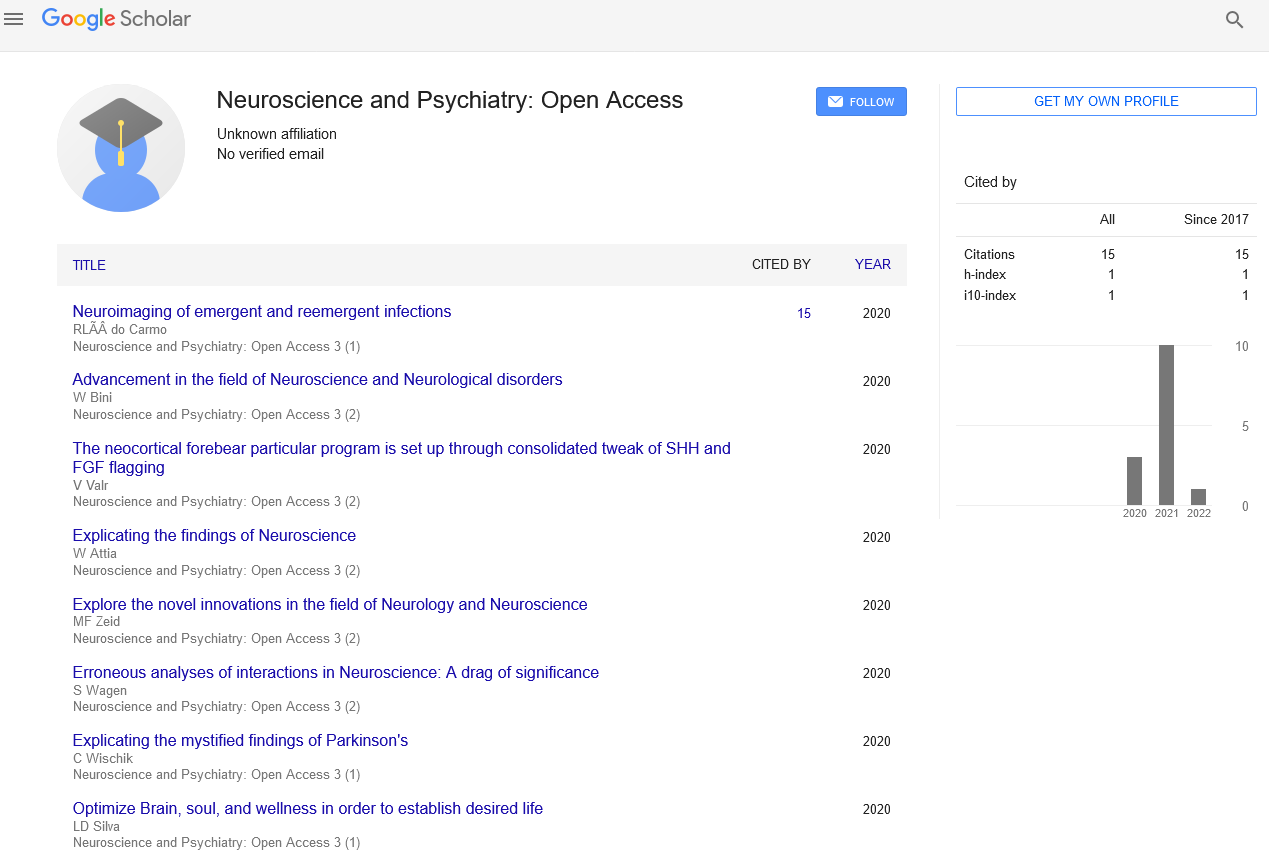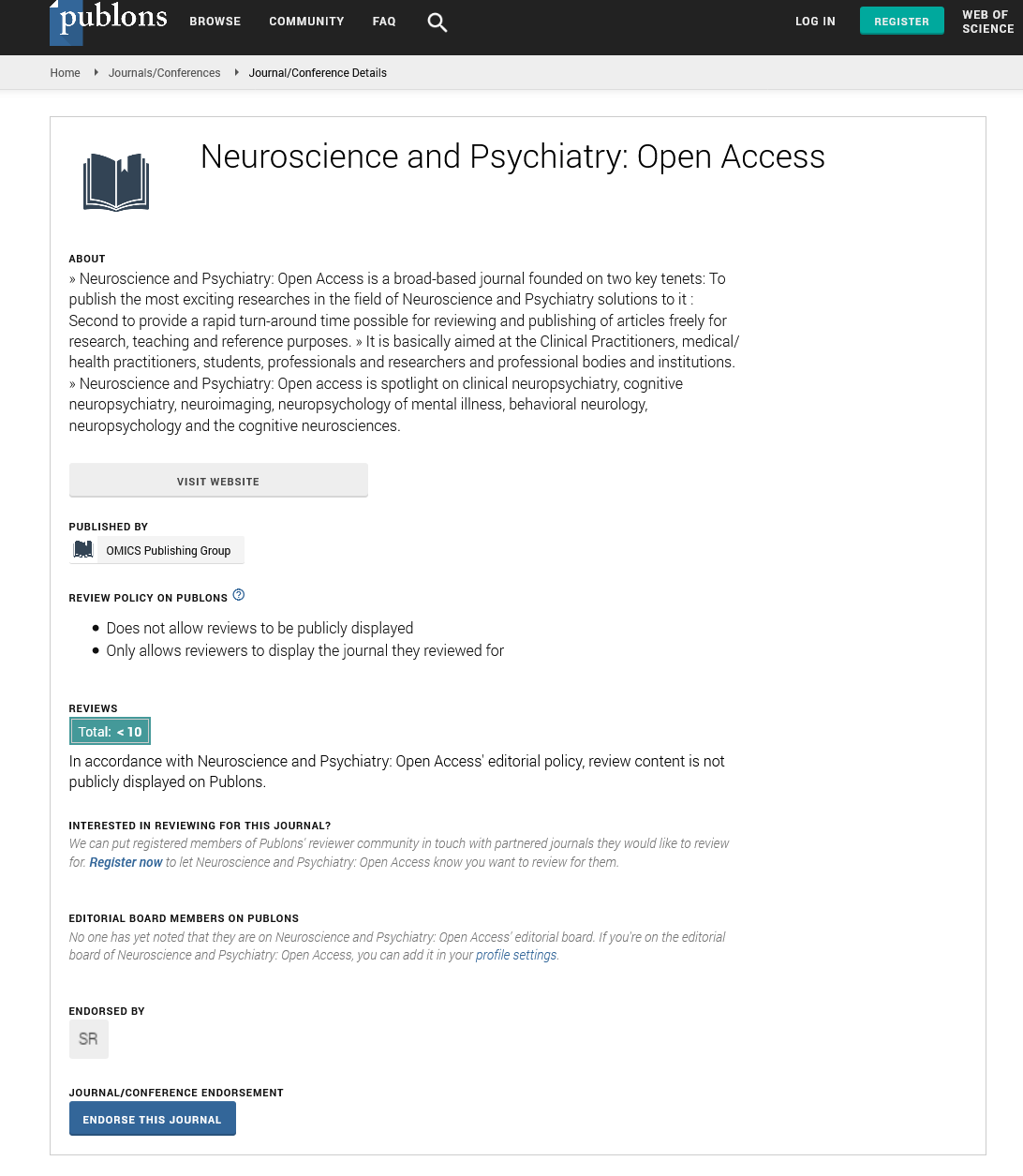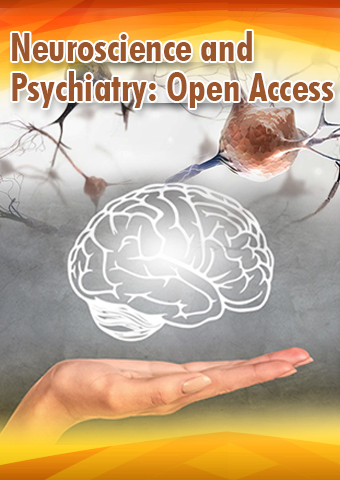Perspective - Neuroscience and Psychiatry: Open Access (2024) Volume 7, Issue 6
Exploring the Connection Between Trauma and Personality Disorders
- Corresponding Author:
- Reza Tadayonnejad
Department of Psychiatry and Behavioral Sciences,
University of California,
San Francisco,
California,
USA
E-mail: rtadayonne@mednet.ucla.edu
Received: 08-11-2024, Manuscript No. NPOA-24-148643; Editor assigned: 12-11-2024, PreQC No. NPOA-24-148643 (PQ); Reviewed: 26-11-2024, QC No. NPOA-24- 148643; Revised: 06-12-2024, Manuscript No. NPOA-24-148643 (R); Published: 13-12-2024, DOI: 10.47532/npoa.2024.7(6).281-283
Introduction
Trauma, whether experienced in childhood or adulthood, has profound and lasting effects on an individual’s mental and emotional health. For many, trauma can lead to the development of various psychological conditions, including personality disorders. These disorders are characterized by enduring patterns of behavior, cognition, and emotion that deviate significantly from cultural expectations and cause difficulties in interpersonal relationships and functioning.
The connection between trauma and personality disorders is well-documented, with research suggesting that early traumatic experiences, particularly those involving abuse, neglect, or abandonment, may play a pivotal role in the formation of dysfunctional personality traits. This article explores the link between trauma and personality disorders, discussing the types of trauma, how trauma impacts personality development, and the various personality disorders most commonly associated with traumatic experiences.
Description
Understanding trauma and its types
Trauma refers to a deeply distressing or disturbing experience that overwhelms an individual’s ability to cope. It can stem from various sources and manifest differently in each person. The effects of trauma are not always immediate but can have long-term psychological consequences, especially if left untreated.
• Acute trauma: Results from a single distressing event, such as an accident, assault, or natural
disaster. While it may be short-lived, acute trauma can leave lasting emotional scars.
• Chronic trauma: Involves prolonged exposure to stressful events, such as ongoing physical
or emotional abuse, long-term illness, or living in a war zone. Chronic trauma often has
more severe effects on mental health and can lead to conditions like Post-Traumatic Stress
Disorder (PTSD).
• Complex trauma: Often occurs during childhood and involves repeated, long-term exposure
to abusive or neglectful environments. Complex trauma significantly impacts personality
development and is frequently linked to personality disorders.
• Developmental trauma: Refers to trauma experienced during critical developmental periods,
particularly in childhood. This can include emotional neglect, physical or sexual abuse, or
witnessing domestic violence. Developmental trauma disrupts emotional regulation, selfperception,
and interpersonal functioning, laying the groundwork for personality disorders.
Personality disorders commonly linked to trauma
While trauma can contribute to the development of various mental health conditions, several personality disorders are closely associated with traumatic experiences. The following are the most commonly studied personality disorders in relation to trauma:
Borderline Personality Disorder (BPD)
Borderline personality disorder is perhaps the most widely studied personality disorder in relation to trauma. Research indicates that a significant percentage of individuals diagnosed with BPD report a history of early childhood trauma, particularly involving physical or sexual abuse, neglect, or emotional abandonment.
For individuals with BPD, trauma often disrupts their ability to form stable identities and regulate emotions, leading to extreme reactions to perceived rejection or abandonment.
Narcissistic Personality Disorder (NPD)
While NPD is often viewed through the lens of grandiosity and entitlement, it can also have roots in trauma. Some individuals with NPD may have experienced emotional neglect or excessive criticism in childhood, leading them to develop a grandiose self-image as a defense mechanism against deep-seated feelings of inadequacy.
For some, the grandiosity seen in NPD serves as a way to protect against the vulnerability and emotional pain caused by trauma.
Antisocial Personality Disorder (ASPD)
Antisocial personality disorder is characterized by a disregard for the rights of others, impulsivity, and a lack of remorse. Research suggests that individuals with ASPD often have a history of trauma, particularly involving neglect, abuse, or exposure to violence during childhood.
Early trauma, particularly in environments where violence or neglect was normalized, can contribute to the development of antisocial behaviors as individuals learn to cope with their circumstances through manipulation, aggression, or defiance.
Dependent personality disorder
Individuals with dependent personality disorder often have an excessive need to be cared for, leading to submissive and clinging behaviors. This disorder is frequently linked to trauma, particularly experiences of neglect, abandonment, or emotional abuse during childhood, which leave individuals feeling helpless or incapable of making decisions independently.
For individuals with this disorder, trauma fosters a sense of inadequacy and reliance on others to provide emotional support and guidance.
Avoidant personality disorder
Avoidant personality disorder is marked by extreme sensitivity to rejection and social inhibition. Trauma, especially in the form of emotional abuse or bullying, can lead to the development of this disorder as individuals become overly cautious in social interactions to avoid further emotional pain.
For individuals with avoidant personality disorder, trauma shapes a worldview where social interactions are inherently threatening, leading to chronic avoidance and withdrawal.
Trauma-informed therapy for personality disorders
Given the strong link between trauma and personality disorders, trauma-informed therapy is essential for treatment. Trauma-informed approaches focus on understanding the effects of trauma on the individual’s emotional and psychological state and integrating that understanding into therapeutic practices. Key elements of trauma-informed therapy include:
• Safety and trust: Therapy must create a
safe and supportive environment where
individuals feel comfortable exploring
their traumatic experiences without fear of
judgment or harm.
• Empowerment: Trauma-informed therapy
emphasizes the importance of empowering
individuals to regain control over their
lives. This includes teaching coping skills,
emotional regulation, and assertiveness.
• Collaboration: Treatment should involve
a collaborative relationship between the
therapist and the individual, ensuring that
the person feels heard, understood, and
actively engaged in the healing process.
Common therapeutic approaches used for treating personality disorders with a trauma focus include Cognitive Behavioral Therapy (CBT), Dialectical Behavior Therapy (DBT), and Eye Movement Desensitization and Reprocessing (EMDR). These therapies help individuals process their trauma, develop healthier patterns of thinking, and improve emotional regulation.
Conclusion
The connection between trauma and personality disorders is well-established, with early traumatic experiences often laying the foundation for dysfunctional personality traits. Whether through abuse, neglect, or abandonment, trauma has lasting effects on an individual’s ability to regulate emotions, form healthy relationships, and maintain a stable sense of self. Understanding this link is crucial for effective treatment, as traumainformed therapies can help individuals heal from past wounds and develop healthier ways of relating to themselves and others. By addressing both the trauma and the resultant personality disorder, individuals can achieve greater emotional resilience and improved mental health.


